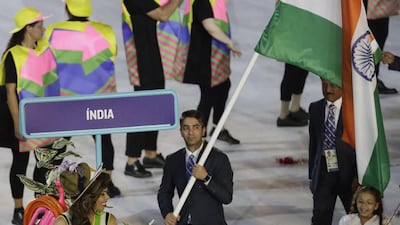Dipa Karmakar has made history by becoming the first Indian in 52 years to qualify for the gymnastics in the Olympics. Is her name known in India? Had I heard of her before the Rio Games began? Was there any publicity around her during the years she has been training that would have made Indians proud of her ambition?
The answer to these questions is no. Karmakar, 23, has appeared out of nowhere, as has 20-year-old Dutee Chand, the first female sprinter in 36 years to compete in the 100-metre event. These women are breaking India’s breathtakingly dismal record in international sport yet no one knows their name or cheers them on. Had it been a cricketer, his every practice session, sniffle or outing with a girlfriend would have been assiduously covered by the media.
India’s obsession with cricket is partly responsible for the lamentable state of all other sport in India, barring field hockey. It eclipses not just public interest but also funding for other sports. But that’s not the only reason that India performs so badly at the Olympic’s. In the past 30 years, it has won only one gold medal. In 2008, it won three medals. Its moment of “triumph” was at the London Olympics, when the country went into raptures over six medals – its best-ever tally.
Why are there so few sportsmen and women among the 1.2 billion Indians? It’s not just cricket. You have to factor in generations of undernourishment among the masses.
Perhaps the most powerful factor is that sport is culturally disprized. The focus is on academic achievements. My son’s principal told me that she would have liked to offer more sports and coaching but other parents were hostile, fearing it would interfere with their child’s academic performance and job prospects. As Indians become wealthier and feel secure about their prosperity down the generations, this insecurity will fade.
But the lukewarm attitude towards sport is also rooted in culture and the status of Brahmins at the top of the social heap. They, as priests, were traditionally the repositories of knowledge and they never did anything physical. Their conduct became the template for others to emulate.
There is no system in India for identifying talent and providing the coaching, facilities, training and money needed to develop it. Corporate sponsorship is beginning to improve but only just. It’s a miracle that any Indian ever makes it to the Olympics.
To be fair, pointing out India’s huge population is not really relevant. When millions are mired in poverty, what chance is there for sport to find a place in their lives? And with so many poor people, the government has to make ending poverty its priority.
Maybe the Olympics are simply not as important to India as they are to China, which made a policy decision that it was a matter of national prestige to win a certain quota of medals. The policy was backed by an aggressive system to identify and nurture talent.
Its booming economy also meant that the funds were available to keep such a system running. China is now ranked eighth in the all-time Olympics medal tally.
It is intriguing how countries with small populations often perform better proportionally at the Olympics than larger nations. As the case of India shows, there is no correlation between size of population and number of medals. At the 2000 Sydney Olympics, for example, Great Britain won only 28 medals, far behind the tally of 58 for Australia, which has about one-third of the population.
Rather than population, it seems to be a country’s GDP and level of government funding of sport that suggests how many medals will be won. For that to be fixed, India will have to wait a while before it can cover itself with glory at the Olympics.
In the meantime, though, there’s the New Zealand cricket team’s tour of India next month to look forward to. And maybe one day yoga will be included as an Olympic sport.
Amrit Dhillon is a freelance journalist in New Delhi

